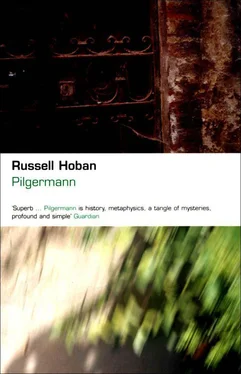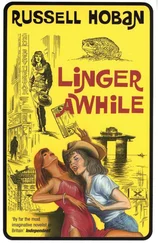Russell Hoban - Pilgermann
Здесь есть возможность читать онлайн «Russell Hoban - Pilgermann» весь текст электронной книги совершенно бесплатно (целиком полную версию без сокращений). В некоторых случаях можно слушать аудио, скачать через торрент в формате fb2 и присутствует краткое содержание. Год выпуска: 2002, Издательство: Bloomsbury Publishing PLC, Жанр: Современная проза, на английском языке. Описание произведения, (предисловие) а так же отзывы посетителей доступны на портале библиотеки ЛибКат.
- Название:Pilgermann
- Автор:
- Издательство:Bloomsbury Publishing PLC
- Жанр:
- Год:2002
- ISBN:нет данных
- Рейтинг книги:5 / 5. Голосов: 1
-
Избранное:Добавить в избранное
- Отзывы:
-
Ваша оценка:
- 100
- 1
- 2
- 3
- 4
- 5
Pilgermann: краткое содержание, описание и аннотация
Предлагаем к чтению аннотацию, описание, краткое содержание или предисловие (зависит от того, что написал сам автор книги «Pilgermann»). Если вы не нашли необходимую информацию о книге — напишите в комментариях, мы постараемся отыскать её.
Pilgermann — читать онлайн бесплатно полную книгу (весь текст) целиком
Ниже представлен текст книги, разбитый по страницам. Система сохранения места последней прочитанной страницы, позволяет с удобством читать онлайн бесплатно книгу «Pilgermann», без необходимости каждый раз заново искать на чём Вы остановились. Поставьте закладку, и сможете в любой момент перейти на страницу, на которой закончили чтение.
Интервал:
Закладка:
‘You saw me listening to the sow,’ I say. ‘She was confessing to me, she was telling me her last will and testament. She was telling me of her many sins, how she repented of them; she had no wish to go on living. She leaves her corporeal being, her bacon, her ribs, her chops, her crackling, all of her sweet flesh and nourishing juices to you her countrymen and to you her fellow pilgrims on the road to Jerusalem, that golden city that is at the same time in the Holy Land far away and in the heart of each of us. May Jesus Christ how savoury be with you and keep you from all harm.’
I let my eyes pass over all of them. I do not expect to leave this place alive. No one moves, no one says a word. Stepping very carefully, as if I am walking on crystal goblets, I go out of the inn yard and back to the road.
8
‘Jesus Christ how savoury’! Almost I said, ‘Jesus Christ our Saviour’, almost those words leapt out of my mouth. Strange, how eager those words are to be said, and stranger still how busy is the idea of being saved. As a boy I was told that there is a big book in which every deed is recorded; on the Day of Judgment one is shown this record, must examine it carefully and sign it. I was told that the righteous go to Gan Eden and the wicked to Gehinnom but even as a child I never believed it; even as a child I sensed that the arrangement of one place for the good souls and another place for the bad ones was simply not such a thing as would happen in a universe of sun and moon and stars, of night and day and the wheel of the seasons. God said a great many things in the time when it was manifesting itself as YHWH; some of them may well have been misunderstood or written down wrong. Or it may be that he put things in a very simple and vivid way so as not to require too much of the general understanding. Space and time have in them no Gan Eden and Gehinnom, no Heaven and Hell as what could be called places, and I cannot believe that anyone can now take seriously the idea of a soul that is simply righteous or wicked. Even the souls of such creatures as Torquemada and Hitler are not simply wicked although the weight of their actions is mostly in the gehinnom of things — I use the word as one might say right or left, up or down, plus or minus. It is in the rotation of eden and gehinnom that we feel the cosmic dance that is the motion of the universe, and in the play of these energies come punishment and reward. My punishment is that such evil as I have done has tuned me to the gehinnom frequency where I vibrate to the memories of all who have done evil; I share their being as well as their memories, and what I remember I remember as a doer remembers. My reward for being no worse than I am is that I remember no more than I do.
And what is this I that speaks now? Only a fiction, a name of convenience, a poste restante for whatever addresses itself to the persistence of memory and the force of idea: there is no Pilgermann distinct from anything else; why should there be? It is difficult for me now to understand why anyone should want a continuance of identity in a life after death. All those ancient mouldering kings entombed with their murdered wives, with their servants and soldiers and horses, with their weapons and chariots, their stone bread, their stony dregs of long-departed wine! Imagine the burial of a mouse with weapons, an ant with concubines! The arrogance, the greed of it! Even now the space all round me is thick with the fat globules of undissolved souls blinking and bleeping their greed for more! more! until the signals fade to silence and the lights go dark. More indeed! Not only human souls — the dying Earth itself moans like a stunned ox; the deeps of space are clamorous with its panting, its unwillingness to be absorbed into the allness from which it came. I have lost my humanity, I have been waves and particles too long to feel what humans feel. And yet, and yet … I remember with something like a pang how I wanted God to come back, how I wanted Jesus not to go away.
I am on the road again. Life is so strange! It is nothing I have ever been able to take for granted, just simply being alive with the world in front of my eyes and looking out through those eyes at the world. And when the eyes are closed, the colours, the patterns, the flashes and flickers; pictures even. How can it be that pictures can be seen with the eyes closed? Dreams! Maybe there were dreams before there was anything else; maybe there were dreams before there were people to dream them. Maybe dream life is the real living and our waking life is just the necessary exercising of our bodily functions in the time between dreams.
I am on the road again, trying to remember the last thing Jesus said to me. ‘From me came the seed that gave me life,’ he said.
He may be right. Look at what he does with stone, it sets time at naught completely; give him any stone and any stonecarver whatever and he can make it happen, he can make his living and his dying be Now, for ever this very moment. He has no need of flesh and blood, he can live in stone as others live in flesh and blood. Partly I understand it: what one thinks of as the hardness of stone is actually its memory, its retention, its capability of holding images and thoughts. That’s why Christ has always been so easy with stone, he comes to it so willingly because it goes with him so willingly; he likes to be long in stone, short in stone, likes to live out his story large and small in shapes of stone. Christ comes for any stonecarver who calls him with his chisel, calls him with his iron to the stone. He has no vanity, does not push himself forward, he takes his place modestly with the other figures, acting out his story as bidden. Because of this the stone is eager to please him, it’s always thinking of new little touches that will put something more into the story. In my drift through what is called time I have my favourites here and there, and as often as not they are after my own time. What an odd thing to say: my own time! That time during which I lived is what I mean, and that sounds equally odd because I have always been somewhere in one form or another; precision with words is impossible.
But I wanted to say something about a particular stone Christ-story, the one in Naumburg Cathedral in the west rood-loft. I believe that it was done in the twelfth or thirteenth century, I don’t know who the sculptor was. There are seven scenes in it: the first is the Last Supper, perhaps it is that moment when Christ is saying, in the Gospel of Mark, Take ye; this is the body of me.’ As Christ speaks these stone words — they are not cut into the stone but they are there in the air of that stone scene — he puts into the mouth of Judas a piece of bread while Judas still dips with his own hand in the dish. The stone and the carver are good with this scene as they are throughout: as Christ with his right hand puts the bread into the mouth of Judas he draws back with his left hand his right sleeve to keep it out of the gravy and in this way the eye is led from the bread to the hand, wrist, and arm of Christ that extend the bread, showing the oneness of the bread with the self of him who gives it. Or it may be — and I rather believe it is — that the moment shown is that one in the Gospel of John when Jesus, having been asked who will be the betrayer, answers, ‘That one it is to whom I shall dip the morsel and shall give him.’ And John goes on to say, ‘And after the morsel then entered into that one Satan.’ Yes, that for me is what is happening in that stone moment. Because all eucharists are double — this is what I know now, this is why I am easy now between the grinding of eden and gehinnom in the mill of the universe. When God was a he he never told us everything; where is it written that he told us all there was to tell? Nowhere. Nor did Jesus tell us everything. He never told — did he, is it written somewhere? I think not — that all eucharists are double; but they are. ‘Take ye; this is the body of me.’ ‘And after the morsel then entered into that one Satan.’
Читать дальшеИнтервал:
Закладка:
Похожие книги на «Pilgermann»
Представляем Вашему вниманию похожие книги на «Pilgermann» списком для выбора. Мы отобрали схожую по названию и смыслу литературу в надежде предоставить читателям больше вариантов отыскать новые, интересные, ещё непрочитанные произведения.
Обсуждение, отзывы о книге «Pilgermann» и просто собственные мнения читателей. Оставьте ваши комментарии, напишите, что Вы думаете о произведении, его смысле или главных героях. Укажите что конкретно понравилось, а что нет, и почему Вы так считаете.












